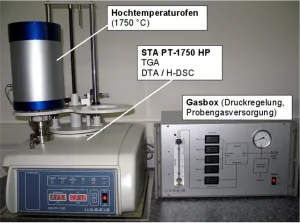Thermogravimetric analysis
Linseis STA PT-1750 HP- Simultaneous thermal analysis under pressure (PSTA)
Thermal analysis is an overarching term for methods in which physical and chemical characteristics of a substance are measured as a function of temperature or time. The sample, in these experiments, is subjected to a controlled temperature program (DIN 51 005).
There is a facility at the Institute for Energy Systems for simultaneous thermogravimetric and differential thermal analyses. The term thermogravimetry (TG) refers to a process in which the weight of a sample is observed during temperature measurement. Differential thermal analysis (DTA, DSC) refers to a method in which the enthalpy of a sample relative to an inert reference is determined. This way, transformative reactions such as phase transitions can be registered. The combination of both processes into one facility is called simultaneous thermal analysis (STA).
The self-developed facility makes investigations at temperatures of up to 1750 °C, and under excess pressure (up to 0.5 MPa = 5 bar) possible. It is referred to as a “Pressurized Simultaneous Thermal Analyzer” (PSTA). The other parameters of the system correspond to the standards of leaders in industry.
For the investigation, the sample is placed in crucibles. Normally, one homogenous sample in the amount of 25 mg (DSC) or 100 mg (DTA) is sufficient. Depending on atmosphere and temperature, various crucible materials are available, such as Al2O3 and platinum (platinum-rhodium). In the purely TG mode, oversized crucibles made of Al2O3 are also available, which can hold several grams of sample mass.
